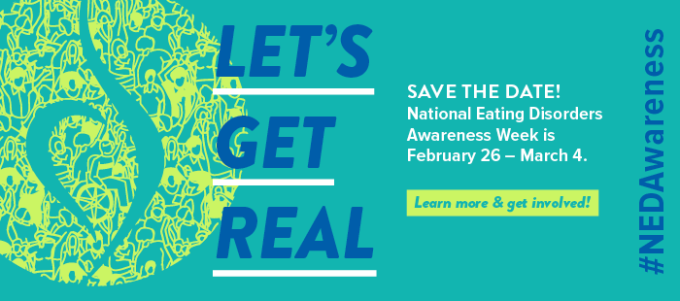NEDA: “Let’s Get Real” About Eating Disorders
Mar 7, 2018
Monday, February 26th through Sunday March 4th was National Eating Disorder Awareness Week. This week is established by the National Eating Disorder Association (NEDA), with the goal of raising awareness of the severity and popularity of eating disorders. The theme the association used for the week this year was “Let’s Get Real”, and its aim was to expand the conversation and highlight eating disorder stories that are often less recognized in narratives about eating disorders. Because eating disorders affect 30 million people a year, it is important to realize eating disorders don’t discriminate between gender, race, sexuality, or body type.
In support of their theme, NEDA released updated statistics on eating disorders earlier this year. Their findings focused on: athletes, marginalized voices, men, dieting and clean eating. According to recent research, college athletes have a much higher risk of developing an eating disorder or experiencing disordered eating. A study NEDA used to support the awareness week focused on 112 female Division II athletes from 7 different sports. Researchers found that 25% have experienced disordered eating, 26% reported menstrual dysfunction, 10% have low bone density, and 3% experienced all of the above symptoms. Collegiate male athletes also struggle with an unhealthy relationship with food. 10% of male athletes are reported as being at risk for becoming anorexic, and 38% are at risk for developing bulimia nervosa.
In addition to growing concerns about college athletes, studies are also looking at the rise of “clean eating” and dieting as related to eating disorders. As the “clean eating” trend gains traction, doctors are seeing a significant increase in disordered eating and eating disorder diagnoses. A clinical report published in the American Academy of Pediatrics found those who dieted moderately were 5 times more likely to develop an eating disorder, and anyone who restricted food intake extremely was 18 times more likely to develop an eating disorder. This, paired with The American Psychological Association report that a third of young girls have dieted, regardless of their weight, is cause for concern according to NEDA.
NEDA hopes the published statistics in their infographics and brochures, along with featured personal testimonies, will bring to light how eating disorders don’t just happen to wealthy, white, teen girls; they affect all populations and are a complex bio-social illness. NEDA wants to expose the unfounded stereotypes, get people screened, and start journeys to healing.
NEDA also provides confidential screening for the possibilities of eating disorders and information on how to get help if you or someone you know is suffering from an eating disorder.










